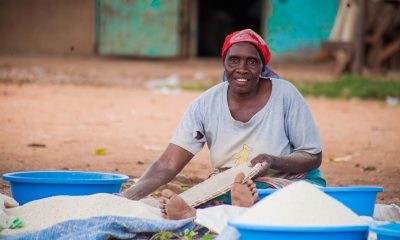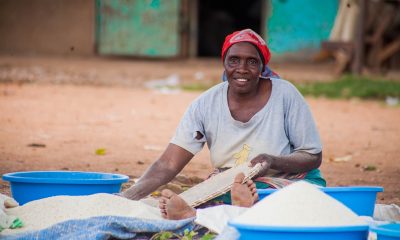Africa
African Development Bank to Triple Financial Aid to Sao Tome and Principe
For reducing public spending, the ADB representative said that “it is very important to see the functions of the various institutions” and their “impact on the development of the country and have consequent measures” aimed at a re-examination of the “distribution and effectiveness of civil servants.” to increase government transparency in Sao Tome and Principe a stable plan for the next five years is needed.

The African Development Bank (ADB) plans to increase to more than €55 million the financial aid to Sao Tome and Principe in the next three years to support macroeconomic stabilization reforms, increase revenues and ensure energy transition.
“Over the next three years of funding, we are very excited, very happy because we are going to have a significant increase in the amount that was made available to Sao Tome and Principe. In the previous cycle the base amount was over $22 million (€20.18 million) looking at the next three years we are probably seeing an increase of almost three times,” said the representative of the African Development Bank.
In an interview with Lusa in São Tomé, Pietro Toigo explained that the amount will be made official in September and “responds to the will of the ADB to support in a more precise, more punctual way” the island countries to face “the vulnerabilities and the climatic, economic pressures in which these types of economies are subject.”
“We are looking at a two-year phased intervention, supporting a reform program that is aimed at macroeconomic and fiscal stabilization, some measures to increase domestic resource collection for the country to have a little more oxygen to implement its policies [because it is a] country very dependent on external finance, increase budget transparency, and put actions for the transformation of the energy system,” the official specified.
Read more on the subject and find the latest economic news of the day with the Born2Invest mobile app.
African Development Bank recommendations
To improve revenue collection, the representative of the ADB argues that the initiative of reforms should be internal and not externally imposed to update the laws of the tax system and allow “mobilizing resources in a more dynamic way,” as well as “increase the effectiveness of public spending,” considering that public resources are scarce.
Pietro Toigo dismisses the need to create new taxes but stresses that “it is very important to focus resources on the administrative implementation of VAT,” which came into force in São Tomé and Príncipe on June 1, and other existing taxes.
As for reducing public spending, the African Development Bank representative argues that “it is very important to see the functions of the various institutions” and their “impact on the development of the country and have consequent measures” aimed at a re-examination of the “distribution and effectiveness of civil servants.”
“The country surely needs more medical personnel and more primary services, on the other hand, we know that some institutions in the central bureaucracy can probably function with fewer employees, so it’s not so much the total reduction, but a rebalancing of the civil servants to ensure a better delivery of services,” explained Pietro Toigo.
On the other hand, the representative of the African Development Bank argued that to increase government transparency in Sao Tome and Principe a stable plan for the next five years is needed and to accelerate the ongoing reform of the law to allow “improvements in the public procurement system.
On the other hand, Pietro Toigo stressed that it is necessary to “enhance the independence and the role of external institutions in overseeing the use of public resources,” namely the Court of Auditors, internal audits, and the Inspectorate General of Finance.
According to the representative of the ADB, these issues were subjects of meetings he had last week with the São Tomense authorities, including the President of the Republic, Carlos Vila Nova, the President of the National Assembly, Celmira Sacramento, and the Prime Minister, Patrice Trovoada.
__
(Featured image by Maklay62 via Pixabay)
DISCLAIMER: This article was written by a third party contributor and does not reflect the opinion of Born2Invest, its management, staff or its associates. Please review our disclaimer for more information.
This article may include forward-looking statements. These forward-looking statements generally are identified by the words “believe,” “project,” “estimate,” “become,” “plan,” “will,” and similar expressions. These forward-looking statements involve known and unknown risks as well as uncertainties, including those discussed in the following cautionary statements and elsewhere in this article and on this site. Although the Company may believe that its expectations are based on reasonable assumptions, the actual results that the Company may achieve may differ materially from any forward-looking statements, which reflect the opinions of the management of the Company only as of the date hereof. Additionally, please make sure to read these important disclosures.
First published in Africa 21 Digital, a third-party contributor translated and adapted the article from the original. In case of discrepancy, the original will prevail.
Although we made reasonable efforts to provide accurate translations, some parts may be incorrect. Born2Invest assumes no responsibility for errors, omissions or ambiguities in the translations provided on this website. Any person or entity relying on translated content does so at their own risk. Born2Invest is not responsible for losses caused by such reliance on the accuracy or reliability of translated information. If you wish to report an error or inaccuracy in the translation, we encourage you to contact us.

-

 Fintech2 days ago
Fintech2 days agoFirst Regulated Blockchain Stock Trade Launches in the United States
-

 Africa1 week ago
Africa1 week agoAir Algérie Expands African Partnerships
-

 Markets5 days ago
Markets5 days agoRising U.S. Debt and Growing Financial Risks
-

 Business2 weeks ago
Business2 weeks agoDow Jones Near Record Highs Amid Bullish Momentum and Bearish Long-Term Fears

























